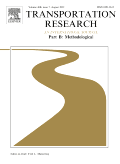
TRANSPORTATION RESEARCH PART B-METHODOLOGICAL
Scope & Guideline
Innovating methodologies for a sustainable transportation future.
Introduction
Aims and Scopes
- Quantitative Modeling:
The journal primarily publishes research that develops and utilizes quantitative models, such as optimization, simulation, and statistical models, to analyze transportation systems and behavior. - Decision-Making Frameworks:
A significant focus is placed on frameworks that aid decision-making in transportation planning and operations, particularly through the integration of various analytical methods. - Behavioral Analysis:
Research exploring human behavior in transportation contexts, including choice modeling and the impact of psychological factors on travel decisions, is a core area of interest. - Network Optimization:
The journal often features studies on optimizing transportation networks, including routing, scheduling, and resource allocation, addressing both freight and passenger transport. - Sustainability and Environmental Impact:
There is a growing emphasis on research that evaluates and proposes solutions for enhancing the sustainability of transportation systems, including the assessment of environmental impacts. - Autonomous and Connected Vehicles:
Research related to the implications of autonomous and connected vehicle technologies on traffic dynamics and transportation systems is increasingly prominent.
Trending and Emerging
- Machine Learning Applications:
The use of machine learning techniques for various transportation applications, such as demand prediction and traffic management, has surged, indicating a shift towards data-driven methodologies. - Mobility as a Service (MaaS):
Research exploring the integration of various transportation services into a single accessible platform is gaining momentum, reflecting changes in user preferences and technological advancements. - Resilience and Robustness in Transportation Systems:
There is an increasing focus on developing frameworks that enhance the resilience of transportation systems against disruptions, emphasizing the need for robust planning and operational strategies. - Environmental Sustainability and Climate Adaptation:
Research addressing the environmental impacts of transportation and strategies for climate adaptation is on the rise, highlighting the importance of sustainability in transportation planning. - Connected and Autonomous Vehicle Research:
The journal is witnessing a growing body of work focused on the implications of connected and autonomous vehicles, particularly their effects on traffic dynamics and urban planning.
Declining or Waning
- Traditional Traffic Flow Models:
Research utilizing classical traffic flow theories and models has become less frequent as newer methodologies, such as machine learning and agent-based models, gain traction. - Static Demand Estimation:
There is a noticeable decline in studies focused on static demand estimation techniques, as dynamic and real-time approaches become more relevant in the context of evolving transportation systems. - Single-Modal Transportation Studies:
The journal has shifted away from research concentrated on single-modal transportation systems, reflecting a growing interest in multimodal and integrated transportation solutions. - Descriptive Statistical Analysis:
Research relying solely on descriptive statistics without advanced analytical techniques appears to be waning, as there is a stronger emphasis on complex modeling and predictive analytics.
Similar Journals
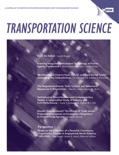
TRANSPORTATION SCIENCE
Shaping Tomorrow's Transportation LandscapeTRANSPORTATION SCIENCE is a premier scholarly journal focusing on the interconnected disciplines of transportation, civil and structural engineering, and social sciences. Published by INFORMS, this journal has been a fundamental resource for nearly five decades, covering seminal research and innovative methodologies that have shaped the field of transportation. With a distinguished Q1 ranking in both Civil and Structural Engineering and Transportation for 2023, it ranks in the top tier of journals, reflecting its significant impact in advancing knowledge and practice. Researchers, professionals, and students will find this journal an essential platform for disseminating their findings and engaging with cutting-edge developments in transportation systems. TRANSPORTATION SCIENCE offers access to robust analytical frameworks and empirical research that contributes to the ongoing conversations in transportation, ensuring that emerging trends and challenges are met with scholarly rigor.
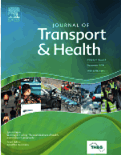
Journal of Transport & Health
Bridging disciplines for a healthier tomorrow.Journal of Transport & Health is a premier peer-reviewed journal published by ELSEVIER SCI LTD, focusing on the interdisciplinary nexus between transportation systems and public health outcomes. Established in 2013, this journal has rapidly ascended to prominence, earning a Q1 ranking in prestigious fields such as Health Policy, Public Health, and Safety Research as of 2023. With a special emphasis on understanding the complex interactions between transport environments and health, it caters to researchers, professionals, and students dedicated to advancing knowledge in these critical areas. The journal not only provides valuable insights into the impact of transportation on health but also addresses related topics in pollution and safety, reflected in its commendable Scopus rankings. Although not open access, the journal remains an essential resource for those seeking to influence policy and practice in transport and health, stimulating discourse and innovation in the field.
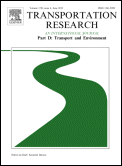
TRANSPORTATION RESEARCH PART D-TRANSPORT AND ENVIRONMENT
Pioneering insights for a sustainable transport landscape.Transportation Research Part D: Transport and Environment is a premier academic journal published by Pergamon-Elsevier Science Ltd, dedicated to advancing knowledge in the fields of civil and structural engineering, environmental science, and transportation. With an impressive Impact Factor and ranked in the Q1 category for 2023 across multiple disciplines, this journal serves as a critical resource for researchers, professionals, and students interested in the intersections of transportation systems and environmental challenges. Spanning the years from 1996 to 2024, the journal features innovative studies that address pressing transportation and environmental issues, fostering interdisciplinary collaboration and insights. Although not an open-access journal, articles published in Transportation Research Part D are accessible through institutional databases, making significant contributions to academia and practice in the UK and globally. Scholars looking to stay at the forefront of research related to sustainable transport solutions and their implications for the environment will find this journal indispensable.
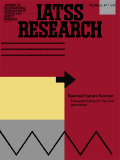
IATSS Research
Empowering researchers to drive impactful change in urban studies.IATSS Research, published by Elsevier Science Ltd, stands as a premier open-access journal at the intersection of engineering, safety research, urban studies, and transportation. Established in 2000, this esteemed journal caters to a diverse audience of researchers, industry professionals, and students eager to delve into innovative research that addresses pressing societal challenges. With an impressive impact factor and a consistent demonstration of high-quality scholarship, IATSS Research has achieved notable rankings within Scopus, including a top-tier position in Safety Research (Rank #13/109, 88th percentile) and Engineering (Rank #46/307, 85th percentile). The journal has evolved significantly since its inception, reflecting the dynamic nature of its converged fields from 2008 to 2024. By embracing open access, IATSS Research amplifies the reach of critical findings and fosters collaboration across disciplines, making it an invaluable resource for anyone invested in advancing knowledge and practices in modern engineering and urban safety.

EURO Journal on Transportation and Logistics
Pioneering insights in the realm of mobility and supply chains.The EURO Journal on Transportation and Logistics, published by ELSEVIER, is a premier open access journal dedicated to advancing the fields of transportation and logistics. Since its establishment in 2013, the journal has become a vital platform for disseminating cutting-edge research and insights, reflecting its significant impact in the academic community, as evidenced by its Q1 ranking in both Management Science and Operations Research and Modeling and Simulation as of 2023. Hailing from the Netherlands, this journal caters to a diverse array of scholarly disciplines, as highlighted by its ranking within the top quartiles across various Scopus categories including Mathematics, Decision Sciences, and Social Sciences. With a commitment to transparency and accessibility through its open access policy since 2020, the journal strives to engage not only researchers but also professionals and students, fostering a collaborative environment for the exploration of innovative solutions within the transportation and logistics sectors.
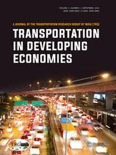
Transportation in Developing Economies
Fostering collaboration for sustainable transport development.Transportation in Developing Economies is a premier academic journal published by SPRINGER INT PUBL AG, specializing in the interdisciplinary study of transportation systems in developing nations. With an ISSN of 2199-9287 and an E-ISSN of 2199-9295, this journal provides an essential platform for researchers, policymakers, and practitioners to explore the unique challenges and innovations in transportation infrastructure, mobility, and planning within emerging economies. The journal aims to critically assess and promote sustainable transport solutions that cater to the socio-economic dynamics of these regions, making it an invaluable resource for those invested in equitable transportation development. With its open access philosophy, it ensures widespread dissemination of research findings, fostering collaboration and knowledge exchange among scholars and industry professionals alike. As the global focus on sustainable practices intensifies, Transportation in Developing Economies stands at the forefront of vital research, contributing to both academic discourse and pragmatic advancements in the field.
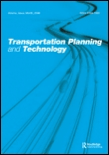
TRANSPORTATION PLANNING AND TECHNOLOGY
Exploring Innovations in Transportation SystemsTransportation Planning and Technology is a prestigious academic journal dedicated to advancing the fields of transportation planning and technology. Published by Taylor & Francis Ltd, this journal serves as a critical platform for disseminating high-quality research and innovative practices in the context of urban and regional transportation systems. With an ISSN of 0308-1060 and an E-ISSN of 1029-0354, the journal has established a significant foothold since its inception in 1972, spanning through to 2024. Recognized in the Q2 category of Geography, Planning and Development and the Q3 category of Transportation in the 2023 rankings, it reflects a solid impact factor supported by its Scopus classifications, holding a rank of #270/821 in Geography, Planning and Development and #72/141 in Transportation. Researchers, professionals, and students alike benefit from the journal's comprehensive scope, which encompasses theoretical aspects, practical applications, and policy implications related to transportation systems. As an essential resource in the field, it invites contributions that enhance our understanding of the complexities in transportation planning, making it a must-read for those engaged in related studies.
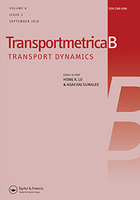
Transportmetrica B-Transport Dynamics
Pioneering Insights in Transport DynamicsTransportmetrica B: Transport Dynamics is a premier academic journal published by Taylor & Francis Ltd, focusing on innovative research in the fields of transportation dynamics, modeling, and simulation. Established in 2013 and running through 2024, this journal holds a prestigious Q1 ranking in Modeling and Simulation, Software, and Transportation categories, reflecting its commitment to high-quality scholarship. With an impactful presence, evidenced by its Scopus rankings—73rd in Mathematics, 57th in Social Sciences, and 174th in Computer Science—Transportmetrica B serves as a critical platform for researchers, professionals, and students seeking to explore and disseminate groundbreaking findings in transport dynamics. The journal is accessible via open access options, ensuring that its valuable insights reach a global audience. As the field of transport continues to evolve, Transportmetrica B remains at the forefront, championing extensive research and development that address the challenges of modern transportation systems.
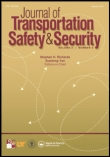
Journal of Transportation Safety & Security
Championing collaboration for a safer transportation future.The Journal of Transportation Safety & Security (ISSN: 1943-9962; E-ISSN: 1943-9970), published by Taylor & Francis Inc, stands as a pivotal resource for professionals and researchers in the fields of safety research and transportation. Since its inception in 2009, this journal has delivered rigorous peer-reviewed articles that explore critical issues relating to safety and security within the transportation sector. With an impressive impact factor reflecting its scholarly significance—ranking Q1 in Safety Research and Q2 in Transportation as of 2023—this journal occupies a unique position in the academic landscape, encouraging innovation and collaboration among researchers dedicated to improving safety measures. The Scopus rankings further affirm its status, placing it 17th out of 109 in Safety Research and 49th out of 141 in Transportation. Readers can expect contemporary discussions and comprehensive reviews tailored to both practitioners and academics alike, effectively bridging the gap between theory and application. Explore the Journal of Transportation Safety & Security to contribute to a safer and more secure transportation environment.
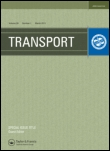
Transport
Connecting researchers to revolutionize transport engineering.Transport is a leading open-access journal published by VILNIUS GEDIMINAS TECH UNIVERSITY, specializing in the fields of automotive and mechanical engineering. Since its transition to open access in 2018, the journal has become a vital platform for disseminating high-quality research and innovative practices in transport systems, engineering technologies, and sustainable mobility solutions. With an ISSN of 1648-4142 and an E-ISSN of 1648-3480, Transport is indexed in Scopus with notable rankings, including Q2 in Automotive Engineering and Q3 in Mechanical Engineering for 2023, reflecting its influential presence within these disciplines. Researchers and practitioners are encouraged to contribute to this scholarly community, where their work will reach a robust international audience, thereby advancing knowledge and fostering collaborations in the ever-evolving transport sector. Based in Lithuania, the journal is committed to maintaining rigorous peer-review standards and promoting interdisciplinary studies to address the complex challenges in transportation engineering.